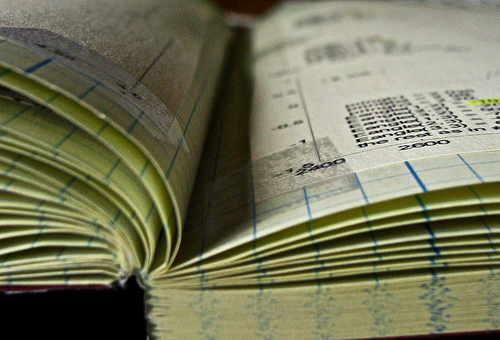I am about to start running a lot of marketing experiments, and I’ve been thinking about keeping a lab notebook, like back in the days of college chemistry. Trust me, I realize that the term ‘growth hacker’ is already breaking bad. But, for me, this is a case of hating the player, not the game.
I still need to work out a format/structure that will make sense, and allow me to focus on the research itself rather than the distraction of playing with the tools. So, I’m trying to nail that down before I get started.

Photo by Julia Manzerova via Compfight (cc)
A couple random ideas picked up along the way:
It looks like I can pretty much stick to the process exactly
- Ask a Question
- Do Background Research
- Construct a Hypothesis
- Test Your Hypothesis by Doing an Experiment
- Analyze Your Data and Draw a Conclusion
- Communicate Your Results
/via Steps of the Scientific Method
And, the following are all random thoughts triggered by Guidelines for Lab Note Books:
Titles will Matter, but Not Too Much
On one hand, the notebook is just for me and only needs to make sense to me. But, if I’m going to be collaborating with others, hopefully I can make them make some sense. I think the most important action here, is not to waste too much time thinking about it.
Maintain a list of future experiments, but remember the hypothesis is more important than the experiment
It would be far too easy to just try random things, without having any justifiable reason to be trying them. Enforcing the step of constructing a hypothesis will be important.
Write down everything, and specifics matter
“Your results hinge on exactly what you do, not how nicely you sugar-coat them in the notebook”
If this was a chemistry experiment, things like the exact calibration of an instrument or whether water was singly distilled or triple distilled would be extremely important. I should also take similar care to note specific details of the experiments I am running. Again, not to waste time, but to produce a reasonable amount of detail. Obviously the specific environment variables of a real-time media landscape will never be precisely replicable… but an experiment should be able to be somewhat replicated.
Might need a glossary
It seems like there might be good reason to keep a glossary page, to make sure the terms we use for different techniques/approaches etc. are consistent.
Drawing is good
“A good drawing can save you several pages of writing and be very clear to other readers.”
Log that data
I was going to use hackpad as the ELN for this process, but starting to think that github might be better so that we can keep code, alongside raw data/results, alongside the wiki/notes on the experiments themselves. There is an interesting project over here that I want to dig into a little deeper.
Discussing the results and documenting the delta
Just as important as all the research itself, is actually making decisions based on the results. For our purposes, we need to document any conclusions about the delta between our hypothesis and the actual results. Then future tweaks or changes can be created before moving forward.
I don’t know what I don’t know
Probably the most dangerous aspect of this whole experiment is that I don’t know what I don’t know. I suspect that running marketing experiments in this format will be interesting and valuable. But (1) I’ve never done this before (2) I haven’t found anyone else who runs this type of process, and (3) I haven’t even really done the original process that often myself that I am trying to apply to this work. So the WHOLE thing is an experiment.
Leave a Reply